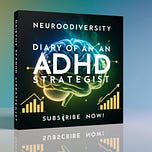Hey, you. Yes, you—the one staring at this screen, feeling like your brain is full of static, or maybe like you’re drowning in a flood of tasks, expectations, and noises you can’t shut off. I see you. I’ve been you. And I want you to know that you are not broken.

Overwhelm isn’t just "a lot on your plate"—it’s a full-body, full-brain experience. Maybe your thoughts are racing so fast you can’t catch a single one. Maybe your body feels like it’s buzzing, your skin too tight, your heart pounding.
Maybe you’re completely numb, unable to start anything, staring into space while guilt whispers in your ear.
If any of this sounds familiar, you are not alone. Overwhelm is something most neurodivergent people—whether you’re autistic, ADHD, dyslexic, or otherwise wired differently—know all too well. But you don’t have to stay stuck in it. Let’s talk about what’s really going on, and more importantly, what we can do about it.
Why Do We Experience Overwhelm So Intensely?
If it feels like the world is too much, that’s because, well… it is. Neurotypical brains filter information differently, automatically prioritizing what’s "important" while tuning out the background noise. Your brain? It might be trying to process everything at once. And that’s exhausting.
Sensory Overload
: When the World is Too Loud, Too Bright, Too Much
Maybe the fluorescent lights in your office feel like tiny daggers in your eyes. Maybe the sound of someone chewing makes your skin crawl. Maybe your clothes itch just enough to make concentration impossible.
Your nervous system is working overtime to process all this input. No wonder it feels like too much—you weren’t meant to function in an environment designed for someone else’s sensory needs.
Executive Dysfunction: When Your Brain Won’t Cooperate
You know what you need to do. You even want to do it. And yet… you don’t. Your brain refuses to start, or it gets stuck in a loop of overanalyzing, or you hyperfocus on something completely unrelated.
This isn’t laziness. Your brain just struggles with the mechanics of starting, stopping, and switching between tasks. It’s like trying to run a marathon when the starting gun never fires.

Social Exhaustion: The Cost of Masking
You’ve spent your whole life learning the "rules" of social interaction—when to smile, when to make eye contact, how to suppress the way you naturally move, speak, or express yourself. Maybe you’ve gotten really good at it. But that effort takes energy, and energy runs out.
If you feel drained after even small social interactions, this might be why. And no, it’s not "just social anxiety." It’s the mental and emotional exhaustion of constantly translating yourself for the world.
So, What Can We Do About It?
Overwhelm isn’t something you can just "push through." You need actual strategies—tools that work for your brain, not against it. Here’s what’s helped me, and what might help you too.
1. Create a Sensory-Safe Environment
Your environment matters more than most people realize. If your world feels like an assault on your senses, you need to take control where you can.
✅ Noise canceling headphones are a game-changer. Use them at work, in public, or even at home if you need to.
✅ Dimmable lighting or blue light glasses can reduce strain if bright lights make you feel on edge.
✅ Comfort objects aren’t childish—they’re necessary. A weighted blanket, a soft hoodie, or a fidget toy can help ground you when things feel too much.
✅ If possible, ask for accommodations. This could mean remote work, a quieter workspace, or permission to wear noise-reducing earbuds. You deserve a space that works for you.
2. Rethink Time Management (Because Planners Alone Don’t Work)
Traditional planners and schedules might not cut it for your brain, and that’s okay. Instead, try:
⏳ The "One Small Step" Rule – If you’re stuck, break the task into the tiniest possible action. Not "clean the kitchen" but "put one dish in the sink." Sometimes, getting started is the hardest part.
⏳ Alarms and Timers – If you struggle with time blindness, set alarms to remind yourself to take breaks, eat, or switch tasks. Bonus: a visual timer (like the Time Timer app) can make time feel more tangible.
⏳ Work With Your Energy, Not Against It – If you function best at night, adjust your schedule where possible. If you need frequent breaks, take them. Your brain isn’t broken—it just operates on its own rhythm.
3. Set Boundaries (And Actually Keep Them)
Saying "no" is hard, especially when people don’t understand why something is overwhelming for you. But protecting your energy is essential.
🚦 Practice short, direct refusals: "I can’t take that on right now." No over-explaining necessary.
🚦 Use "delayed responses" when you’re unsure. Instead of saying yes out of guilt, try: "Let me think about it and get back to you."
🚦 Guard your recovery time like your life depends on it—because it does. If you need solitude after socializing, plan for it. If work drains you, set firm boundaries around your off-hours.
4. Find Community (Because You Are Not Alone)
Nothing is more validating than hearing someone say, "Oh my god, me too." Finding people who get it can be life-changing.
🌍 Online spaces like r/Neurodiversity or dedicated Discord servers can connect you with others who understand your struggles.
🌍 Follow neurodivergent creators who share coping strategies and experiences (because representation matters).
🌍 Consider therapy—but make sure your therapist actually understands neurodivergence. A neurodiversity-affirming therapist won’t try to "fix" you but will help you find strategies that work for your brain.
Final Thoughts: You Deserve to Exist Without Overwhelm Controlling Your Life
Listen, I know this world wasn’t built with us in mind. And I know it’s exhausting trying to navigate a system that demands we function in ways that aren’t natural to us.
But you are not failing.
You are not lazy.
You are not broken.
Your brain works differently, and that means you need different tools. There is nothing wrong with adapting the world to fit you instead of the other way around.
So today, pick one small thing. Adjust one sensory input. Set one boundary. Take one guilt-free break.
You are allowed to exist as you are. And you are worthy of a life that feels manageable, peaceful—even joyful.
And if no one has told you today: I’m proud of you.
FAQs
1. How do I explain my overwhelm to neurotypical people?
Try using metaphors: "It’s like having 100 browser tabs open, and I can’t find the one playing music." Or: "It feels like being in a crowded room where everyone is shouting at once." Concrete examples help others understand.
2. What if I can’t change my environment?
Small changes still matter. Noise-reducing earbuds, tinted glasses, and personal rituals (like stepping outside for fresh air) can make a difference.
3. Is it okay to take a break when I feel like I should be productive?
Yes. Rest is productive. Your brain needs downtime to function.
4. How do I stop feeling guilty about my needs?
Remind yourself: You’re not asking for extra support—you’re asking for equal access to comfort and function.
5. What’s one thing I can do right now to reduce overwhelm?
Pause. Breathe. Take one small action to make your space or mind feel safer—turn down a light, drink water, or step outside. One tiny step is still progress.













Share this post